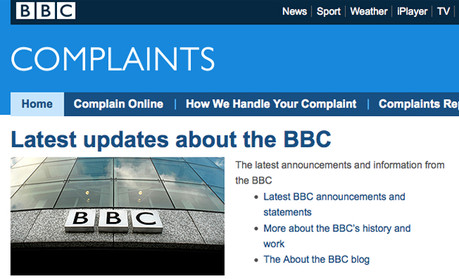
The BBC's complaints site. The corportation will launch a corrrections and clarifications page
The BBC will launch a corrections and clarifications page online and recruit a new chief complaints editor the BBC Trust said today as it launched a public consultation over other proposed changes to improve its complaints procedure.
In an announcement the Trust outlined a total of seven proposals "designed to improve the clarity and efficiency of the process", which have now been opened up for public assessment.
This includes better explanations about each stage of the process, cutting down the "time spent corresponding about trivial, hypothetical or vexatious complaints" and making the processing of "similar complaints about a single issue" faster through a collective approach to their handling.
The Trust today also confirmed three actions the BBC plans to take to improve its handling of complaints, including the creation of a page on the BBC's website dedicated to corrections and clarifications, as first outlined by the Trust in July last year.
This comes as titles in the newspaper industry introduce such columns within their printed pages, as launched by the Daily Mail, the Mail on Sunday and the Metro last year. In evidence to the Leveson inquiry at the beginning of this year, editor of the Telegraph Tony Gallagher also said he "may need to consider" the introduction of a corrections column "in due course".
In a release BBC Trust chairman Lord Patten, who carried out the review of "governance processes" last year which called for actions to be taken to improve the broadcaster's complaints system, said: "The BBC is the world's greatest broadcaster, but it isn't perfect and it does sometimes get things wrong.
"When it does, it needs to make amends quickly and apologise if appropriate. The proposed changes are designed to make the process faster, simpler and easier to understand for audiences and give genuine complaints the priority they deserve. We want to know if people think they will achieve that."
In the announcement Richard Ayre, chairman of the Trust's complaints and appeals board, said the public consultation will run for six weeks before the "final plans" are published in the summer.
The proposals in full, as announced by the BBC Trust, are listed below:
- Making the complaints process simpler and fairer by explaining better how it will work at each stage;
- Ensuring that complaints are more comprehensively recorded by encouraging complainants to use the central address, phone number and website link for all editorial and general complaints;
- Focusing resource on responsive handling of substantive complaints that raise real issues about the BBC's output;
- Reducing the time spent corresponding about trivial, hypothetical or vexatious complaints, while retaining the right of all complainants to appeal to the BBC Trust;
- Bringing the time limit for complaints about website content into line with the 30-day rule that applies to broadcasts, again with a right of appeal to the Trust for those that are out of time;
- Speeding up the handling of similar complaints about a single issue by treating them all together; and
- Setting a more detailed procedure for complaints about complaints handling and about the actions of the Trust."
"We have been working closely with the BBC Trust to look at ways that we can improve the process and the feedback from the public consultation will be extremely helpful in enabling us to do this."
Free daily newsletter
If you like our news and feature articles, you can sign up to receive our free daily (Mon-Fri) email newsletter (mobile friendly).
Related articles
- Newsrewired speaker spotlight: Naja Nielsen on innovation, leadership and Nordic media
- How to listen to people who avoid the news, with Shirish Kulkarni, Abdi Yusuf and Rhiannon White
- Can AI help overcome biases and shortcomings in data journalism?
- Community-led listening project offers solutions to journalism’s biggest challenges
- How Reuters, Newsquest and BBC experiment with generative AI











